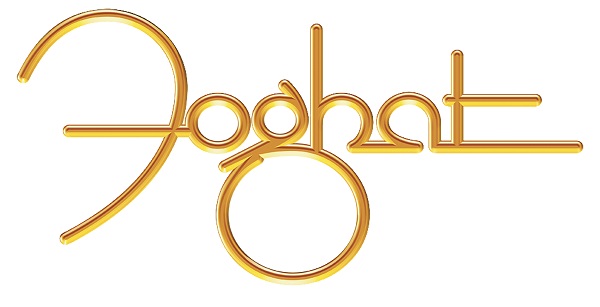Episode # 4 by Mike Mettler, official FoghatStorian 03-03-22
The right man for the right job. That phrase, in a nutshell, describes new Foghat lead vocalist/guitarist Scott Holt to a blues-tinged T. Following Charlie Huhn’s retirement from the band in early January, Scott joined the family fold officially on January 13, 2022. From there, he immediately began rehearsing with Foghat founding drummer/percussionist Roger Earl, guitarist/vocalist Bryan Bassett, and bassist/vocalist Rodney O’Quinn for two truly intense weeks of preparation before making his triumphant debut with the band at the Mohegan Sun Wolf’s Den in Uncasville, Connecticut on January 28. As soon as the quite appropriate “Road Fever” kicked off their galvanizing set that night, all was truly right in Foghat World.

Jumping feet-first into the role of Foghat’s frontman might seem like a daunting task to some, but it’s something Scott has handled with style, grace, grit, and much aplomb — even if it took him a few tries to get up to speed in his mind, that is. “Here’s the funny thing about what I learned about these songs,” Scott reveals. “When you are in your car and you’re singing along to a song, you know every word. You sing every lick, and you know exactly how the song goes. But when you set up with the band to recreate that song, to play that song, it’s a whole different animal because now, you’re not singing along to a recording. The energy of playing a song live is completely different from listening to a record, and that’s always been the case for me. There’s knowing the songs, and then there’s knowing the songs. There was a big gap between knowing how ‘Slow Ride’ goes, and actually being able to play ‘Slow Ride’!” At this point in our group conversation, Roger looks directly at Scott and begins playing the opening to “Slow Ride” with his hands hammering the beat on his knees while also mouthing the iconic opening guitar riff, all in perfect time together. Scott laughs, then admits, “Roger knows it way better than me!” (Take it eeee-zay. . .)
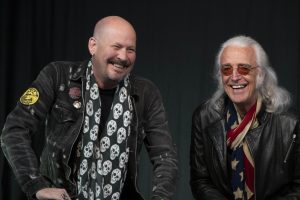
Photo: Samuel W Johnston – Outsuite LLC
If the rabid fan response from the Mohegan Sun, plus the band’s electrifying appearance on the Rock Legends Cruise that set sail from Port Canaveral, Florida out onto the high seas from February 14-18 and the subsequent trio of shows in both Florida and Mississippi between February 24-26 are any indication, Foghat is already firing on all cylinders here in 2022. Indeed, all Foghat fans are in for a very special treat when the band dives right back into their burgeoning 2022 tour schedule in mid-March. (You can see all the currently scheduled Foghat tour dates right here. More shows are being added constantly, so please keep checking back!)
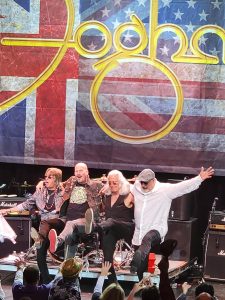
Of course, Scott Holt is no stranger to the Foghat faithful. Besides playing alongside his fellow Foghat bandmates Roger, Bryan, and Rodney (along with a few other good friends of the family) in the finely tuned, Shaken and Stirred, blues-lovin’ Earl & The Agitators, Scott also made his presence quite known on seven of the 12 tracks found on Foghat’s acclaimed June 2016 studio album, Under the Influence, including “Upside of Lonely,” which has since become a key element in the front half of the band’s current live set.
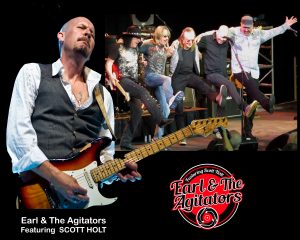
Scott first entered the Foghat orbit properly back in 2014, when the band was looking for an ‘understudy’ for their lead vocalist (just in case). “I came down here to Florida,” he recalls, “and it was me and Roger, Craig [MacGregor, the band’s bassist until 2015 who subsequently passed away in 2018], and Bryan. Roger had given me a list of Foghat songs to learn. I did my homework as hard as I could. I was nervous, as you can imagine, and wanted to do a good job. They were all very welcoming and were like, ‘Just relax. Let’s play and have fun.’ I had a great time, so that’s a very fond memory.” (To borrow a line from John Lennon, Scott had already passed the audition years before he even knew he was technically having one.)
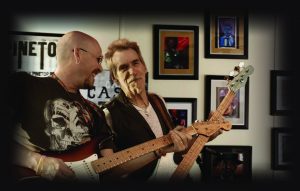
Fact is, Scott has a lifetime full of music bonafides on his resumé. Born just south of Nashville in Lawrenceburg and having grown up forty-five miles south of there in Columbia, Tennessee, Scott’s early love affair with music consisted of a true melting pot of different but interconnected genres. “It was obviously a lot of country music to start because my parents liked country,” he acknowledges. “They also both sang in church, so there was a lot of gospel too. But I don’t remember hearing any blues until I actively heard about it — and then I went out and found it. That was way later when I was 19.”
Like many of us, Scott’s imagination was instantly fueled by the one and only Jimi Hendrix. “The first time I heard Jimi Hendrix, I picked up a guitar and said, ‘I got to play guitar — and I want to do that for the rest of my life,’” he confirms. “Behind that was figuring out where Jimi got his stuff from, so then I found out about B.B. King. Muddy Waters, Elmore James, Buddy Guy, and all those cats. And then it became kind of a treasure hunt, trying to find all those records. I think the first straight-up blues record I ever bought was a Vanguard Records compilation that had a Buddy Guy track on it.” (Scott subsequently had the honor of playing guitar right alongside Buddy Guy for many years — a story we will get much deeper into in a future FoghatStory.)
 ;
; 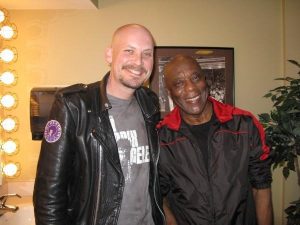
After the blues bug bit Scott hard, there was no turning back. “Once I found the blues, I spent all my money on blues tapes,” he continues. “I was finding out about everybody. If somebody told me it was blues, I would try it out and see if it was something that appealed to me. Like Roy Buchanan — he was definitely a one-of-a-kind guitar player. I think those were always the guys that appealed to me. In those early days, nobody sounded like anyone else, you know. John Lee Hooker didn’t sound like B.B. King, who didn’t sound like Muddy Waters. You could tell by a couple of notes who you were listening to. Roy was like that. Nobody played Elmore James like Elmore James. Hubert Sumlin, who primarily played with Howlin’ Wolf, was his own thing too.”
The deeply ingrained level of knowledge and understanding Scott has about the blues is something that has long appealed to Roger as an artist. “I’ve always tried to surround myself with really good players,” the drummer agrees as he nods toward Scott. “Ever since the first band I was in, in fact, I’ve always played with people who are really good players. I know that helped. We had really great players in Savoy Brown when I was 20 years old. It was like, ‘Wow. Well, this is happening.’ And that, of course, was when I was playing with Rod and Dave.”
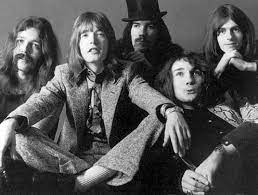
Rod and Dave are, of course, Roger’s cofounding bandmates in Foghat — namely, slide guitar and dobro master Rod Price, and lead vocalist/guitarist Lonesome Dave Peverett. (Bassist Tony Stevens rounded out the original four-piece.) Scott readily admits he feels a direct connection to Rod and Dave as his spiritual brothers. “I definitely feel a responsibility not to imitate them, but to try and understand them,” Scott observes. “I talk to Roger about this a lot. He gives me insight as to what their intentions were or what they might have been so I don’t ever stray too far from what Foghat is supposed to sound like, and what it’s supposed to be like.”
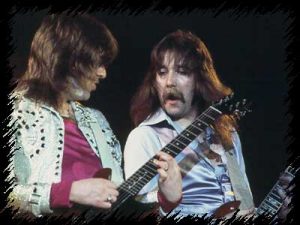
Roger adds, “You know, Rod and Dave were both great guitar players in their own right. Very different players. But Dave always, always, came up with a hundred percent performance every time. He was basically a Chuck Berry fan, and a big blues fan. Sometimes he would play a roaring solo like a train rolling downhill with no brakes! (Scott laughs) Dave’s playing was like he emoted it. And Rod did that as well, in his way. I mean, Rod had this fantastic vibrato on his slide. I remember other guitar players pointing that out at the time, but Rod also played with great emotion. He was technically gifted, and he was very schooled in blues as far as his musical heroes go. He played with emotion, and you can especially hear it on his live stuff. Rod and Dave were both great guitar players. They emoted. They weren’t sloppy. They weren’t careless about that because they cared a great deal about their playing — and that’s what’s important.”
How does the original Foghat template laid down by Rod and Dave back at the very beginning of the band compare with how Bryan and Scott fit into Foghat’s guitar/vocal tandem in 2022? “Bryan’s the same way,” Roger notes. “He cares about his playing. He has that same attitude — and Scott is the same way too. He lives with his guitar!” Just as they have all throughout our quite lively conversation, Roger and Scott look at each other and laugh together knowingly — like two long lost peas now living in the same pod. (It’s really quite endearing to see, I must admit.)
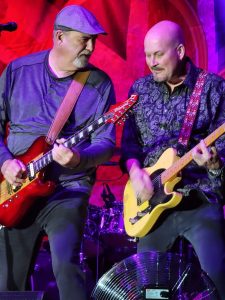
“It’s all about the emotions,” Scott concurs. “To me, the virtuoso blues players are not the guys who are playing the most incredible phrases so much as it’s the ones who are putting the most emotional content into what they’re playing. Roger has just described Dave and Rod perfectly. They’re both emotional players. You can hear that joy and energy in Dave’s playing, and Rod had that incredible vibrato that was just such a broad sweep when he would do those things live. They’re both highly underrated as players, I think.” Roger immediately chimes in with his own firsthand ruling: “Oh, I’ll rate them! I’ll rate them.” More laughter ensues all around. (Hear, hear!)
I then hit Scott with the serious question of the day: What do you see as Foghat’s legacy being over the next 20 years? Scott pauses, then deadpans, “Post-punk industrial zydeco. That’s a genre that hasn’t had a lot of attention. I really think we can find a niche there.”
He is, of course, kidding. His real answer is as follows: “I just think if we keep the legacy alive, make new music and it holds up to the original music of the Foghat catalog, we’ll have it just right.” Scott then cites “Home in My Hand” as one of his favorites to play in the current Foghat live set, a song that’s the perfect bridge between the band’s past, present, and future if ever there was one.
Roger again nods his own approval and concludes, “When we did the Agitators, I think we hit the nail on the head, didn’t we? That’s why it feels sort of natural now. When Scott, myself, and Bryan started writing, it was fun. We enjoyed the creative aspect. We were like, ‘Do that again! Play that part twice — no, three times! — and then go to the other part!’ It wasn’t hard work. It was great fun.”
As if it isn’t obvious enough by now, Roger is beyond pleased to have Scott as his fulltime Foghat bandmate. “I’m happy. Everybody’s happy,” he acknowledges. “The rehearsals have been hard on Scott because he’s hard on himself. But it’s been great fun. I mean, we’re really enjoying it. We sit around together, we have dinner, we have a drink, and then we talk about music.”
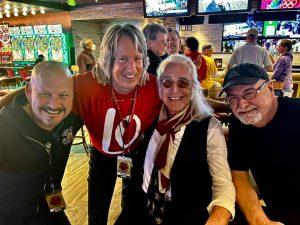
The band that stays together offstage plays together even better onstage, I say. With Scott Holt fully accepted into the fold, the mighty Foghat foursome, Mach 2022, are traveling across the land and trying to earn a living, giving everything they can.
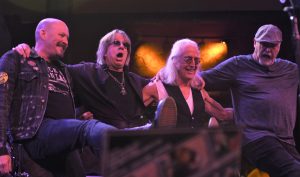
Photographed by Steve Sirios
Keep an eye on this space for many more in-depth FoghatStories to come, including two additional new installments right here in the month March — all of which are the precursors for the officially authorized Foghat biography by author Mike Mettler that we currently have in the works! Stay tuned!!
